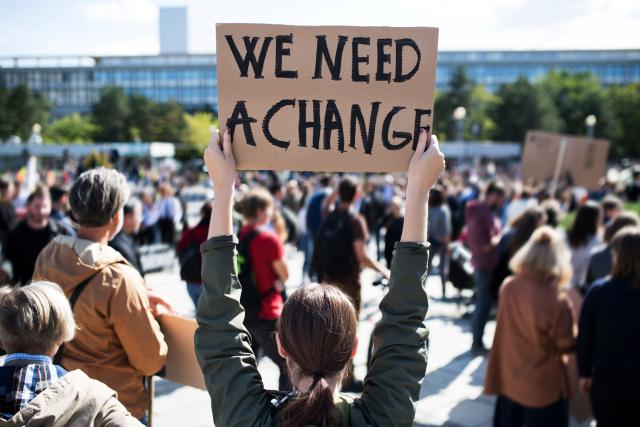Environmentalists have bluntly disparaged federal government parties over their continued support of industries known for their pervasive contribution to the climate crisis.
The Global Annual to Decadal Climate Update revealed the chance of temporarily exceeding the 1.5°C threshold has risen steadily since 2015.
In 2015 the chance percentage was near to zero.
Between 2015-2020, it increased to 10 per cent.
It is estimated that by 2026, it will have increased to 50 per cent.
The statistics show the planet is on track to reach the disastrous 1.5C of warming earlier than predicted, with the World Meteorological Association expecting the breach as early as 2027.
Leader of the Australian Greens Adam Bandt has slammed the Labor and Liberal parties for continuing to support the industries causing the climate crisis.
“We are on the verge of going over the climate cliff, but Labor and Liberal are actively making the problem worse,” Mr Bandt said.
“Both major parties are using the petroleum industry conference this week to try and outbid each other on their support for an industry killing the planet.
“By pushing more gas, Labor and Liberal are putting lives at risk, bringing worse fires, floods and droughts to Australia.”
The Paris Agreement of 2015 was adopted by 196 parties across the globe.
The goal since then has been to limit the temperature increase to 1.5°C above pre-industrial levels.
But the Greens say Australia’s governments have failed to align their emissions reduction with this goal.
They have warned Labor’s 43% emissions reduction target by 2030 simply isn’t enough, especially when it is coupled with ongoing support for resource depletion.
Both Labor and Liberal have again shown they are ‘at the disposal’ of the gas industry at the Australian Petroleum Production and Exploration Association (APPEA) conference held from 15-18 May.
In an article for ‘The Conversation’, Adjunct Professor Crawford School of Public Policy at Australian National University Richard Denniss warned upcoming projects could triple Australia’s annual emissions.
“Australia has 116 new coal, oil and gas projects in the pipeline,” Mr Denniss wrote.
“If they all proceed as planned, an extra 1.4 billion tonnes of greenhouse gases would be released into the atmosphere annually by 2030.”
Greens spokesperson for Environment, Senator Sarah Hanson-Young says polluting projects are “failing to be assessed for the emissions they create”.
“In 2023 there is no excuse for environmental approval to be given to new coal or gas projects without considering climate pollution,” she said.
“If the Albanese Government is truly committed to net zero, then introducing strong environmental laws with a climate trigger must be a priority.”
A 2019 paper from Tom Swann of the Australia Institute explained Australia’s emissions accounting does not take into consideration those generated off-shore.
According to the paper, “Australia is the largest coal exporter in the world and on recent reports the largest LNG exporter too”.
“For every Australian, the country mines 57 tonnes of fossil fuel CO2 per year,” Mr Swann said.
“That is ten times greater than the world average.
As one of the world’s foremost countries for fossil fuel exports, Mr Swann says “the CO2 potential of these exports is more than twice as much as the greenhouse gas emissions Australia emits domestically”.
Greens leader Adam Bandt fears the consequences of ignoring export emissions.
“We share the atmosphere with the rest of the people on the planet,” he said.
“The consequences will come back to bite us.”
If the Australian government fails to drastically cut down on emissions, both domestically and through exports, citizens nationwide will suffer.
The Climate Council outlines the “grave” consequences of the 1.5 degree rise.
Extreme heat events will see an increase of 14 per cent.
Sea levels will rise by 0.40 metres, and ice-free arctic summers will become more frequent.
Species loss will increase by 18 per cent.
In the ocean, things become more dire.
Coral reefs will decline by a further 70-90 per cent, and there will be a 1.5 million tonne decline in marine fisheries.
The Climate Council has warned “breaching 1.5 degrees Celsius of warming significantly increases the risk of triggering abrupt, dangerous and irreversible changes to the climate system”.
APPEA’s conference in May was focused on net zero technologies within the industry such as carbon capture, utilisation and storage (CCUS) and low-carbon hydrogen.
APPEA advocated how the industry is central to a future energy system with lower emissions.
“The gas industry is at the centre of enabling emissions reductions in a cleaner energy future,” APPEA Chief Executive Samantha McCulloch said.
“Natural gas is important because it is backing up renewables in electricity, supporting major industries such as manufacturing and being used to create everyday products.
“And while we’re delivering energy security and emissions reductions, we will be among the biggest taxpayers in Australia, delivering over $16 billion to governments this year to help build schools, roads and hospitals.”
ExxonMobil CCS Facilities Engineering Lead Alan Black says Victoria’s Gippsland Basin Joint Venture (GBJV) is examining a major oil and gas project which could convert and recycle infrastructure for carbon capture utilisation and storage (CCUS) to help protect the environment.
“A global challenge exists to rapidly decarbonise, and the Gippsland Basin is a prime location to support the storage of large quantities of CO2,” Mr Black said.
The question of new oil and gas mines in Australia is a contentious one.
Western Port Biosphere CEO Mel Barker says “now is the time for all to engage constructively in working out solutions”.
“Several big ticket energy projects are being considered and assessed for Western Port, including port infrastructure and shipping to support the construction of wind turbines in Bass Strait and a potential hydrogen export terminal,” she said.
“While we support the transition as quickly as possible away from fossil fuels, it is critical the potential impacts on Western Port’s fragile ecosystems are assessed.”
The Western Port Biosphere is a hub of diverse and climate-tackling ecosystems.
Ms Barker says it will take all parties to ensure the biosphere is protected and managed.
“It is important to connect with all parties, including fossil fuel generators, and agree on strategies and on-the-ground action,” she said.
Doctors for the Environment Australia (DEA) has warned against opening any new gas or coal mines in Australia.
“As doctors, we are worried about the impact of rapid global warming, particularly as we move into the next El Nino, which could result in the next wave of heat stress, bushfire and smoke related deaths- especially for vulnerable people such as children, the elderly, and those with chronic illness,” said Dr Mike Forrester, Victorian Chair of DEA.
“The world’s top scientists have called for an end to the mining and burning of gas, oil and coal, which are the main causes of climate change.
“Any fossil fuels mined in Australia will be burned on our planet, with direct implications for all of our health, for centuries to come.
“Our health and way of life will depend on decisions we make this decade.”
The International Energy Agency clearly stated in their ‘Net Zero by 2050 report’ that “no new oil and natural gas fields are needed in the net zero pathway”.
Despite this, Ms McCulloch is advocating for the creation of new gas supplies.
“New gas supply is needed, especially in Victoria and New South Wales, to keep the lights on, avoid shortfalls and put downward pressure on prices as it increasingly partners with renewables to ensure reliable electricity,” she said.







